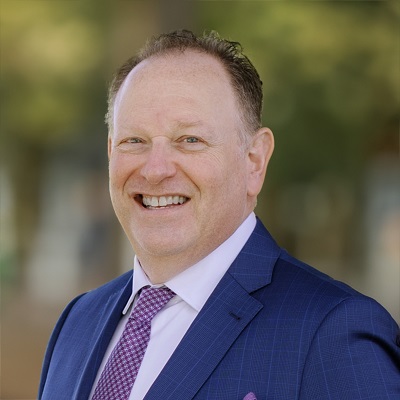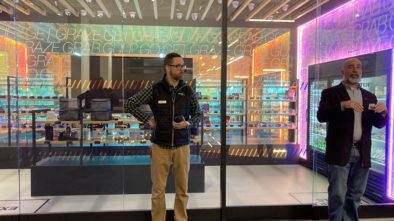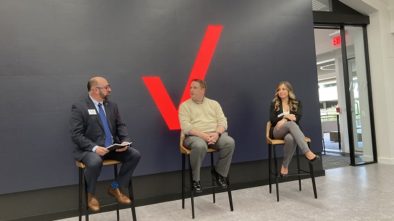Marlton-Based envoyatHome Pioneers “Passive Behavior Discovery” to Keep At-Risk People Out of Hospitals
How can you tell when a person living with dementia is wandering around at night? How can you figure out if an elderly person living alone may be headed for a fall? How can you be sure that, when patients are sent home from rehab or the hospital, they will recover and thrive? Rob Blatt, the cofounder and CEO of envoyatHome (Marlton), tells us that passive behavior discovery can tell you all of that, in a way that is nonintrusive to the patients or older people living alone.
Digital health startup envoyatHome was founded by Blatt and CTO Frederick Bresani in early 2020, before the pandemic struck. During COVID, envoyatHome participated in the University City Science Center Launch Lane Accelerator, in Philadelphia. The company’s patent, focused on passive behavior discovery, was awarded in 2021.
According to Blatt, passive behavior discovery is a way to understand what’s really happening to someone who’s living in a home, whether their family home or an assisted living facility, wherever the home may be. “We want to know those underlying behaviors and activities that they’re doing, since behavior is the largest determinant of health.”
While other industries such as online shopping or searching have been tracking consumer behavior for a long time, until passive behavior discovery, the healthcare industry didn’t have a way to monitor and analyze such behavior in a home or assisted living facility. For example, if someone who has returned home from the hospital starts going to the bathroom a lot, it’s noted by the software. Perhaps they have a urinary tract infection or other condition of which they are unaware that could complicate their recovery.
Blatt notes that the company doesn’t make medical diagnoses. What it does do is utilize sensors, software and surface data to warn clinicians to bring in patients before their conditions get so bad, they’ll need hospitalization.
“We’ve taken the data that’s generated by an individual and put some guardrails around it because we don’t want to provide medical advice,” Blatt said. “We want to be able to furnish the data to the right clinical folks who can use that information to provide earlier interventions, better care and lower costs, which are some of the key things that the medical community is trying to achieve.
“When you combine that with a generative AI [artificial intelligence] in terms of how do you really get to the data quickly to suss out what’s happening, you can begin to surface risks that weren’t known before. Having this new data set allows you to be more forward looking, to be able to look through the windshield, if you will, rather than looking out of the rearview mirror.”
Although envoyatHome is primarily a data and software company, with the advent of smart home tech, putting sensors in the home is super easy and very affordable, Blatt continued. “We just sit on top of that. We have permission to access the data, and we do that in real time. We discover this behavior in real time, both from a safety and wellness perspective. Then, we can take this data that we have and use it in ways to help families look at data over time, compare themselves to other populations and compare populations to other populations.” And, Blatt added, the company uses the data to personalize an experience for the person who lives alone, thus lowering the cost of providing healthcare to people living at home, while improving outcomes.
The primary reason that envoyatHome has taken off is the trend away from “pay for services” towards “pay for outcome.” The fact that the startup’s software can uncover behaviors and enable interventions keeps people out of the ER and out of the hospital. And that increases population health while reducing costs.
Blatt discussed his funding journey, noting that Phase 1 Ventures had provided some early funding that was matched by the State of New Jersey. The startup also received a grant from the New Jersey Economic Development Authority’s Commission on Science, Innovation and Technology (CSIT) to further develop its technology.
As Blatt explained, the grant enabled the construction of a generative AI component that allows both clinicians and family members to ask questions and note surface issues from the database envoyatHome is creating. “We’ve been able to take our data and bring it into a private ChatGPT [via an API] and ask questions such as, ‘Can you tell me about Mrs. Smith’s activities over the last few days? How does that compare to the baseline? Are there any risks or concerns that we should know about or anything unusual happening?’ We now can [uncover] important insights that could help healthcare companies manage populations.”
Blatt noted that the startup is now taking the next steps toward reaching commercial milestones. “We’re going to begin connecting with partners to bring this data set into the healthcare ecosystem. We’re looking to identify the forward-tech leading providers of healthcare that are serious about bringing innovation into their ecosystem. It’s about improving outcomes. It’s about lowering cost. It’s about improving the entire caregiver experience, the clinical experience. We believe that our forward-looking data set can provide all kinds of opportunities,” he said.
“We are aligning ourselves with those partners who share our views and, where we can, bringing this into the ecosystem. There’s a population of patients that are being serviced by Medicare Advantage plans or other health plans, and we can surface those risks for these payers and provide clinical decision support. We can also help clinicians triage care, bringing care to people that need it, who may not be able to access this care and may not be able to afford it. And we can enable that to happen before people wind up in the hospital.”
Apart from the two cofounders, envoyatHome includes several staff members, including a growth and sales employee. The startup also has “colleagues who work with us who are clinicians who originated from Penn Medicine. For example, in the CSIT project we had a subject matter expert whose day job is at Penn Medicine, in Princeton. We have relationships with some of the leading academics at the University of Pennsylvania, across the river. And we’ve used other folks for the right projects on a contractor basis.”




